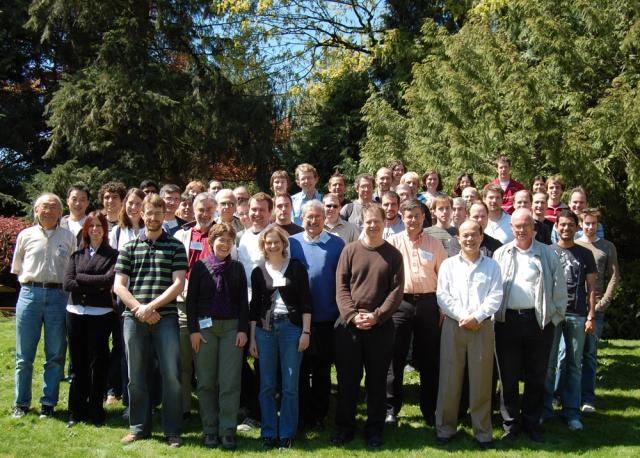The Large Hadron Collider (LHC) is the world's largest particle accelerator and will be the highest energy collider ever built. It collides counter-circulating proton beams and was built at CERN, the European Organization for Nuclear Research, in Switzerland. Single beams were first circulated in September of 2008 but due to technical difficulties, operations were suspended. After making the necessary repairs and adding safety features, high-energy collisions are finally expected this fall. Anticipating this exciting event, the Theory Groups at TRIUMF and Carleton University organized a three day workshop to discuss the physics that could be discovered in the first year of LHC operation. The workshop took place April 27-30 at TRIUMF.
This workshop addressed the types of physics the LHC will discover. It provided ideas of what experiments will look for and how to address the experimental challenges of looking for all the exotic signatures theorists dream up. Structured in the form of talks and open discussions, the participants had a chance to obtain updates from experimenters and share their impressions. Many experimenters from across Canada also attended, as ATLAS-Canada was also meeting at TRIUMF during the same week. TRIUMF is home to the ATLAS Tier 1-Centre, one of eleven Tier-1 centres in national computing facilities around the world. The TRIUMF Tier 1 will participate in the storage and analysis of petabytes of data generated by the ATLAS experiment. TRIUMF's involvement in the LHC made the lab an attractive venue and led theorists, researchers and students from North America and Europe to attend this event. Professor Ulrich Baur from State University of New York at Buffalo explains "listening to these high level talks from junior and senior people was a great opportunity to meet new people and interact with our experimental colleagues." Others like Frank Petriello from the University of Wisconsin described it almost like a scouting mission where you get to see firsthand those that will take on great positions and make important contributions to the field of physics. JoAnne Hewett, Professor in the Theory Group at SLAC National Accelerator Laboratory gave the colloquium titled "Discovering the Quantum Universe: The Role of Particle Accelerators" at the workshop. When asked about her impressions she said "It's been a great workshop! Anytime you bring a group of theorists together to talk in one place, good things happen. In particular it's been very nice to see our Canadian colleagues and meet the young Canadian students."
The workshop was organized by theorists from Carleton University: Stephen Godfrey, Pat Kalyniak, and Heather Logan and from TRIUMF: David Morrissey (Harvard/TRIUMF), John Ng , with the support of Isabel Trigger. Participants were very pleased with the committee's efforts to organize the scientific program and provide the logistics for this successful event.
Participants of the LHC Physics Workshop at TRIUMF
By: Maria Jose Crousillat
Communications Assistant

